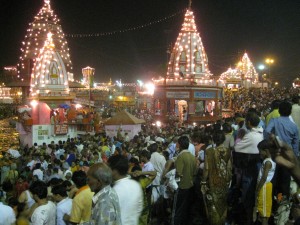Midnight Pilgrimage (Part II)
We set out from Rishikesh around 9pm carrying only shoulder bags with the essentials. Carrying no expectations.
The footbridge had been reopened for two-way traffic at the late hour and we crossed easily. On the other side, a policeman directed us to a taxi stand, where the only driver remaining agreed to take us to Haridwar on the back road. Outside of town, the bypass road ran through a forest along a canal. Half an hour passed before we met another car, but as soon as the traffic picked up, it came to a standstill. After another thirty minutes, we had moved ahead only a car length or two. For days we’d been running at Rishikesh’s escalated pace; slowing down felt dangerous. We paid our driver and started to walk. We knew we were getting close when we began to pass empty cars, abandoned where they stood in the lineup. (No wonder the traffic wasn’t moving.) Suddenly the trees thinned and Haridwar appeared below us, glowing fluorescent and excited. A city awake past its bedtime.
We entered Haridwar through a vast tent city. The area accommodated not just the millions of pilgrims who came for the Kumbh, but hundreds of babas who offered teachings to their followers in elaborate structures erected especially for the festival. The arched doorway of one such camp was flanked by gigantic golden papier-mâché lions. Another, the temporary home of Pilot Baba, stood as tall as a three or four-story building. Some were covered in photos of teachers from their lineage, others draped with hundreds of marigold garlands that had clearly been changed that day. All were curiously empty.
We asked how to get to Har-ki-Pauri Ghat, the spot where the nectar had fallen and the epicenter of the Kumbh, the place where all our sins would be washed away. We were directed to a road demarcated by tall wooden fencing on both sides that looked like it was made for herding cattle. So this was where everyone was. Our foreign faces attracted attention and we were quickly lost in conversation with other pilgrims headed the same way. I didn’t realize quite how large the crowd had grown until, wondering if we’d missed a turn, we stopped to look at the map I had torn from my Lonely Planet. People began to trip over us immediately. A policeman yelled at us to keep moving. The road had become one-way; wherever it was going, so were we. As I stuffed the map back into my bag, I thought about pausing just a moment longer to prepare myself. But by then I was already in motion, though I couldn’t remember deciding to take a step.
We squeezed onto a bridge, the crowd growing denser still. I felt my body steady against its own adrenaline, one long deep breath taken with every limb. I thought, pace yourself, Janna. I remembered Yogi’s advice. I thought, hesitation is most dangerous of all. Let me be a willing part of this. I smiled. A squeezed in front of me and I reached forward to grab hold of the strap of his bag. Behind, Aaron held onto mine. I looked at my watch; it was just after midnight. All the while moving forward.
Up ahead I saw two boys glance back to scan the faces in the crowd, looking for someone. I recognized them; Aaron had talked to them on the footpath. We were being led. Elbows jutted into my sides; toes flicked across the top of my sandals; every inch of me pressed against someone else. We continued shuffling forward. The crowd was so thick I could feel others’ movements more cleanly than my own. I saw the wild current of the river below the bridge, which seemed to have become narrower. I wondered if it was still the same bridge. I saw buildings up ahead, and more people. Everything slightly blurry. How long had we been walking? I couldn’t stop smiling.
Suddenly the bridge ended and we reached a thin strip of land. At its edge was a stretch of the Ganga diverted from the rest of the river, no wider than 20 feet. On the opposite bank lay Har-ki-Pauri, unmistakable, awash in a light that seemed too warm to be electric. At the sight of it–the prospect of arrival finally real–the crowd lost its pace. Some people paused, trying to locate a straggling companion or the final turn that would deliver them to the ghat. Others swerved, unsure of which way to go but unable to stop moving. Policemen pushed through the crowd, whistling orders barely heard. The ground was slick with the water of bodies recently bathed. I took it all in, never losing sight of our guides who turned back occasionally to check on us. Still moving forward.
We made our way across to the opposite bank and claimed a small patch of space on the steps that led down to the river. As I peeled off my bag and scarf and slipped out of my sandals, our guides told us that we should dunk either 11 or 101 times. I headed towards the water, my legs trembling in the sudden stretch of meeting each downward step. The stairs continued into the Ganga; I came to a stop where the icy water reached my waist. I pushed up onto my toes, released, and slid under the surface. Count, Janna. One. I propelled myself above the water and back down again. Two. I realized that the water was freezing, though it was more a thought than a sensation. What I felt was momentum–my own, the crowd’s, the river’s. What I felt was pure charge. Three. I focused on maintaining rhythm, moving measured, refusing to rush.
Eleven. The first thing I saw when I opened my eyes was A next to me, beaming; I was sure I looked the same. As we walked back up, one of our guides asked if I had made a wish. I laughed. What could I have possibly wished for? All I felt was ridiculous, expansive gratitude. We had decided to go to Rishikesh before we knew the Kumbh was going on only 40km away. We had departed for Haridwar hours after we‘d decided to make the trip. And none of us had considered that we would be able to bathe at Har-ki-Pauri at all–but there we were, in the early hours of the holiest bathing day of the Kumbh, all our sins erased.
When we called our friend Goswami to tell him about our time at the Kumbh, he congratulated us, saying we had earned good karma for the rest of our lives. I wondered if the system was fixed. I couldn’t quite write it off to coincidence that we had been in the right place at the right time so many times over; that we had met guides as soon as we had decided to let ourselves be guided. To experience such a blessed pilgrimage, we must have already done something right. Something big.
But I realized all that later, for the day had only just begun. It was almost 2am. I was sopping wet and already catching a chill. It was time for chai–and to look for a place to sleep…








2 Comments